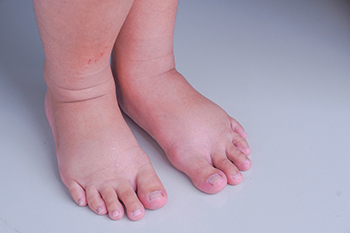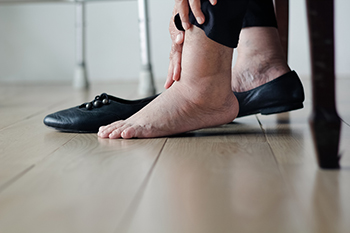Blog

Osteoarthritis, or OA, in the big toe is medically referred to as hallux rigidus. This progressive and degenerative condition is characterized by the breakdown of cartilage at the first metatarsophalangeal, or MTP, joint. As the cartilage in the MTP joint deteriorates, the bones rub together, causing pain, swelling, and stiffness. This discomfort in the big toe often leads to difficulty in bending the toe, and affects mobility and everyday activities, like walking. Furthermore, OA in the big toe can worsen other foot conditions, such as bunions, corns, calluses, and hammertoes. This may further complicate movement and cause additional discomfort. Treatment options for OA in the big toe start with conservative methods, such as pain management and custom orthotic devices. In more severe cases, surgical intervention may be suggested, depending on the severity of the condition and the patient's individual needs. Seeking prompt medical attention from a podiatrist is important for diagnosing and managing hallux rigidus effectively, as early intervention can help to alleviate symptoms, improve mobility, and enhance overall quality of life for individuals affected by this condition. If you believe you may have osteoarthritis that is affecting the big toe, it is suggested that you schedule an appointment with a podiatrist.
Toe pain can disrupt your daily activities. If you have any concerns, contact Dr. Dean D. Hinners of Illinois. Our doctor can provide the care you need to keep you pain-free and on your feet.
What Causes Toe Pain?
Most severe toe pain is caused due to a sports injury, trauma from dropping something heavy on the toe, or bumping into something rigid. Other problems can develop over time for various reasons.
Toe pain can be caused by one or more ailments. The most common include:
- Trauma
- Sports injury
- Wearing shoes that are too tight
- Arthritis
- Gout
- Corns and calluses
- Hammertoe
- Bunions
- Blisters
- Ingrown toenails
- Sprains
- Fractures (broken bones)
- Dislocations
When to See a Podiatrist
- Severe pain
- Persistent pain that lasts more than a week
- Signs of infection
- Continued swelling
- Pain that prevents walking
Diagnosis
In many cases the cause of toe pain is obvious, but in others, a podiatrist may want to use more advanced methods to determine the problem. These can range from simple visual inspections and sensation tests to X-rays and MRI scans. Prior medical history, family medical history, and any recent physical traumatic events will all be taken into consideration for a proper diagnosis.
Treatment
Treatments for toe pain and injuries vary and may include shoe inserts, padding, taping, medicines, injections, and in some cases, surgery. If you believe that you have broken a toe, please see a podiatrist as soon as possible.
If you have any questions please feel free to contact one of our offices located in Metropolis and Eldorado, IL . We offer the newest diagnostic tools and technology to treat your foot and ankle needs.

Swollen feet, a common occurrence, can be attributed to various factors that impact the delicate balance of fluid regulation in the body. One primary cause is fluid retention, often linked to prolonged periods of standing or sitting, particularly in hot weather. The force of gravity hinders efficient circulation, leading to fluid pooling in the lower extremities. Additionally, dietary choices high in sodium can contribute to water retention, exacerbating swelling. Injuries or trauma, such as sprains or fractures, may trigger localized swelling as the body's natural response to inflammation. Conditions like venous insufficiency or deep vein thrombosis disrupt blood flow, promoting fluid accumulation. Pregnancy and hormonal fluctuations can also lead to swelling in the feet. If your feet are swollen, it is suggested that you consult a podiatrist who can determine what the cause is, and offer appropriate relief methods.
Swollen feet can be a sign of an underlying condition. If you have any concerns, contact Dr. Dean D. Hinners of Illinois. Our doctor can provide the care you need to keep you pain-free and on your feet.
Swollen feet are a common ailment among pregnant women and people who stand or sit for extended periods. Aging may increase the possibility of swollen feet and patients who are obese often notice when their feet are swelling too. There may be medical reasons why swollen feet occur:
- Phlebitis - A condition that causes the veins to become inflamed and can also cause leg pain.
- Liver disease - This may lead to low blood levels of albumin which is a protein. This can cause fluid in the blood to pass into the tissues and several areas of the body can become swollen.
- Heart failure - When the heart doesn’t pump properly the blood that is normally pumped back to the heart can pool in the veins of the legs causing swollen feet.
- Kidney disease - One of the main functions of the kidneys is releasing excess fluid in the body. This type of condition can make it difficult for the kidneys to function properly, and as a result the feet may become swollen.
- Deep-vein thrombosis (DVT)- This is a serious condition where blood clots form in the veins of the legs. They can block the return of blood from the legs to the heart which may cause the feet to swell. It is important to be treated by a podiatrist if this condition is present.
Swollen feet can also be caused by bone and tendon conditions, including fractures, arthritis, and tendinitis. Additionally, there may be skin and toenail conditions and an infection may cause the feet to swell. Patients who take medicine to treat high blood pressure may be prone to getting swollen feet.
Many patients elevate their feet to help relieve the swelling and this is generally a temporary remedy. When a podiatrist is consulted the reason behind the swelling can be uncovered and subsequently treated.
If you have any questions please feel free to contact one of our offices located in Metropolis and Eldorado, IL . We offer the newest diagnostic tools and technology to treat your foot and ankle needs.

Aging gracefully is a journey that encompasses various changes throughout the body, and the feet are no exception. The intricate network of bones, muscles, and joints in the foot makes it particularly susceptible to the effects of aging. Certain conditions may arise, including plantar fasciitis, flat feet, and osteoarthritis. Plantar fasciitis involves inflammation of the ligament, called the plantar fascia, on the bottom of the foot. This condition often results from participating in high-impact exercises or wearing ill-fitting shoes. The telltale sign is sharp heel pain, especially pronounced in the morning. Flat feet, a consequence of aging and genetic predisposition, can lead to tired feet, painful arches, and swelling on the inner sides. This condition occurs when the supporting tendons and ligaments lose elasticity, a common side effect of aging, and causes the arches to weaken. Osteoarthritis, a prevalent concern for adults over 65, can affect the feet due to the intricate structure of bones and joints. While age increases the risk, repeated ankle sprains may also contribute to arthritis. If you are experiencing any of these foot problems, it is suggested that you schedule an appointment with a podiatrist.
Proper foot care is something many older adults forget to consider. If you have any concerns about your feet and ankles, contact Dr. Dean D. Hinners from Illinois. Our doctor can provide the care you need to keep you pain-free and on your feet.
The Elderly and Their Feet
As we age we start to notice many changes in our body, but the elder population may not notice them right away. Medical conditions may prevent the elderly to take notice of their foot health right away. Poor vision is a lead contributor to not taking action for the elderly.
Common Conditions
- Neuropathy – can reduce feeling in the feet and can hide many life-threatening medical conditions.
- Reduced flexibility – prevents the ability of proper toenail trimming, and foot cleaning. If left untreated, it may lead to further medical issues.
- Foot sores – amongst the older population can be serious before they are discovered. Some of the problematic conditions they may face are:
- Gouging toenails affecting nearby toe
- Shoes that don’t fit properly
- Pressure sores
- Loss of circulation in legs & feet
- Edema & swelling of feet and ankles
Susceptible Infections
Diabetes and poor circulation can cause general loss of sensitivity over the years, turning a simple cut into a serious issue.
If you have any questions please feel free to contact one of our offices located in Metropolis and Eldorado, IL . We offer the newest diagnostic and treatment technologies for all your foot and ankle needs.

Podiatrists are specialized healthcare professionals who focus on the diagnosis, treatment, and prevention of disorders related to the feet and lower extremities. Podiatrists undergo extensive education and training, equipping them with the knowledge to address a spectrum of foot conditions, from common ailments to complex issues. Their responsibilities encompass conducting thorough examinations, utilizing diagnostic tools, and devising personalized treatment plans. Podiatrists commonly treat conditions such as bunions, heel pain, and toenail disorders. They may also provide guidance on proper foot care, footwear selection, and preventive measures. These professionals operate in diverse settings, including private practices, hospitals, and outpatient clinics. Some podiatrists specialize further in areas, such as sports medicine or surgery, offering comprehensive care for individuals of all ages. If you have foot or ankle problems, it is suggested that you make an appointment with a podiatrist.
If you are dealing with pain in your feet and ankles, you may want to seek help from a podiatrist. Feel free to contact Dr. Dean D. Hinners from Illinois. Our doctor can provide the care you need to keep you pain-free and on your feet.
What Is a Podiatrist?
A podiatrist is a doctor of podiatric medicine who diagnoses and treats conditions of the foot, ankle, and related structures of the leg. Your podiatrist may specialize in a certain field such as sports medicine, wound care, pediatrics, and diabetic care. Podiatrists have the ability to become board certified through training, clinical experience, and then taking an exam.
What Do Podiatrists Do?
On a daily basis, a podiatrist may perform the following activities:
- Diagnose foot ailments such as ulcers, tumors, fractures, etc.
- Use innovative methods to treat conditions
- Use corrective orthotics, casts, and strappings to correct deformities
- Correct walking patterns and balance
- Provide individual consultations to patients
It is very important that you take care of your feet. It’s easy to take having healthy feet for granted, however foot problems tend to be among the most common health conditions. Podiatrists can help diagnose and treat a variety of feet related conditions, so it is crucial that you visit one if you need assistance.
If you have any questions please feel free to contact one of our offices located in Metropolis and Eldorado, IL . We offer the newest diagnostic and treatment technologies for all your foot and ankle needs.
